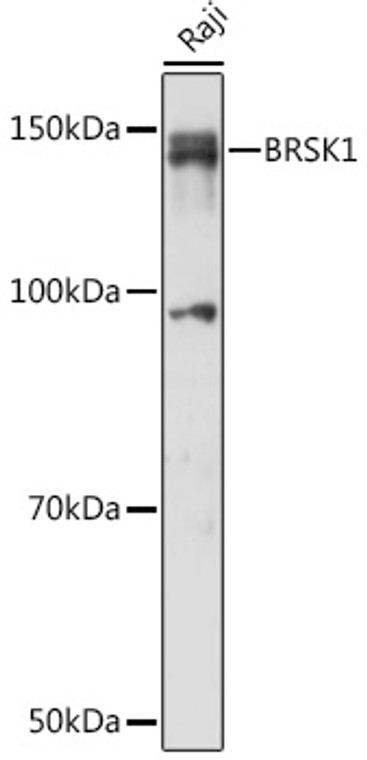| Host: |
Rabbit |
| Applications: |
WB/IHC |
| Reactivity: |
Human/Mouse/Rat |
| Note: |
STRICTLY FOR FURTHER SCIENTIFIC RESEARCH USE ONLY (RUO). MUST NOT TO BE USED IN DIAGNOSTIC OR THERAPEUTIC APPLICATIONS. |
| Short Description: |
Rabbit polyclonal antibody anti-BRSK1 (310-510) is suitable for use in Western Blot and Immunohistochemistry research applications. |
| Clonality: |
Polyclonal |
| Conjugation: |
Unconjugated |
| Isotype: |
IgG |
| Formulation: |
PBS with 0.01% Thimerosal, 50% Glycerol, pH7.3. |
| Purification: |
Affinity purification |
| Dilution Range: |
WB 1:500-1:2000IHC-P 1:50-1:200 |
| Storage Instruction: |
Store at-20°C for up to 1 year from the date of receipt, and avoid repeat freeze-thaw cycles. |
| Gene Symbol: |
BRSK1 |
| Gene ID: |
84446 |
| Uniprot ID: |
BRSK1_HUMAN |
| Immunogen Region: |
310-510 |
| Immunogen: |
Recombinant fusion protein containing a sequence corresponding to amino acids 310-510 of human BRSK1 (NP_115806.1). |
| Immunogen Sequence: |
PSNGELDPDVLESMASLGCF RDRERLHRELRSEEENQEKM IYYLLLDRKERYPSCEDQDL PPRNDVDPPRKRVDSPMLSR HGKRRPERKSMEVLSITDAG GGGSPVPTRRALEMAQHSQR SRSVSGASTGLSSSPLSSPR SPVFSFSPEPGAGDEARGGG SPTSKTQTLPSRGPRGGGAG EQPPPPSARSTPLPGPPGSP R |
| Tissue Specificity | Widely expressed, with highest levels in brain and testis. Protein levels remain constant throughout the cell cycle. |
| Post Translational Modifications | Phosphorylated at Thr-189 by STK11/LKB1 in complex with STE20-related adapter-alpha (STRADA) pseudo kinase and CAB39. Not phosphorylated at Thr-189 by CaMKK2. In contrast, it is phosphorylated and activated by CaMKK1. May be inactivated via dephosphorylation of Thr-189 by PP2C. |
| Function | Serine/threonine-protein kinase that plays a key role in polarization of neurons and centrosome duplication. Phosphorylates CDC25B, CDC25C, MAPT/TAU, RIMS1, TUBG1, TUBG2 and WEE1. Following phosphorylation and activation by STK11/LKB1, acts as a key regulator of polarization of cortical neurons, probably by mediating phosphorylation of microtubule-associated proteins such as MAPT/TAU at 'Thr-529' and 'Ser-579'. Also regulates neuron polarization by mediating phosphorylation of WEE1 at 'Ser-642' in postmitotic neurons, leading to down-regulate WEE1 activity in polarized neurons. In neurons, localizes to synaptic vesicles and plays a role in neurotransmitter release, possibly by phosphorylating RIMS1. Also acts as a positive regulator of centrosome duplication by mediating phosphorylation of gamma-tubulin (TUBG1 and TUBG2) at 'Ser-131', leading to translocation of gamma-tubulin and its associated proteins to the centrosome. Involved in the UV-induced DNA damage checkpoint response, probably by inhibiting CDK1 activity through phosphorylation and activation of WEE1, and inhibition of CDC25B and CDC25C. |
| Protein Name | Serine/Threonine-Protein Kinase Brsk1Brain-Selective Kinase 1Brain-Specific Serine/Threonine-Protein Kinase 1Br Serine/Threonine-Protein Kinase 1Serine/Threonine-Protein Kinase Sad-BSynapses Of Amphids Defective Homolog 1Sad1 HomologHsad1 |
| Cellular Localisation | CytoplasmNucleusCytoskeletonMicrotubule Organizing CenterCentrosomeSynapsePresynaptic Active ZoneCytoplasmic VesicleSecretory VesicleSynaptic VesicleNuclear In The Absence Of Dna DamageTranslocated To The Nucleus In Response To Uv- Or Mms-Induced Dna Damage |
| Alternative Antibody Names | Anti-Serine/Threonine-Protein Kinase Brsk1 antibodyAnti-Brain-Selective Kinase 1 antibodyAnti-Brain-Specific Serine/Threonine-Protein Kinase 1 antibodyAnti-Br Serine/Threonine-Protein Kinase 1 antibodyAnti-Serine/Threonine-Protein Kinase Sad-B antibodyAnti-Synapses Of Amphids Defective Homolog 1 antibodyAnti-Sad1 Homolog antibodyAnti-Hsad1 antibodyAnti-BRSK1 antibodyAnti-KIAA1811 antibodyAnti-SAD1 antibodyAnti-SADB antibody |
Information sourced from Uniprot.org
12 months for antibodies. 6 months for ELISA Kits. Please see website T&Cs for further guidance











